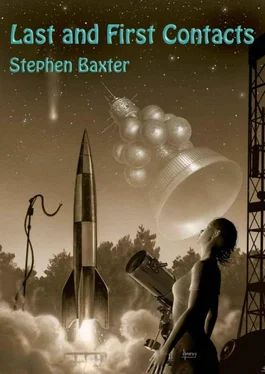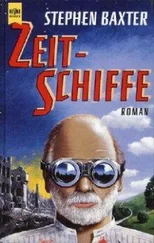Stephen Baxter - Last and First Contacts
Здесь есть возможность читать онлайн «Stephen Baxter - Last and First Contacts» весь текст электронной книги совершенно бесплатно (целиком полную версию без сокращений). В некоторых случаях можно слушать аудио, скачать через торрент в формате fb2 и присутствует краткое содержание. Город: London, Год выпуска: 2012, ISBN: 2012, Издательство: NewCon Press, Жанр: Фантастика и фэнтези, на английском языке. Описание произведения, (предисловие) а так же отзывы посетителей доступны на портале библиотеки ЛибКат.
- Название:Last and First Contacts
- Автор:
- Издательство:NewCon Press
- Жанр:
- Год:2012
- Город:London
- ISBN:978-1-907069-40-6
- Рейтинг книги:5 / 5. Голосов: 1
-
Избранное:Добавить в избранное
- Отзывы:
-
Ваша оценка:
- 100
- 1
- 2
- 3
- 4
- 5
Last and First Contacts: краткое содержание, описание и аннотация
Предлагаем к чтению аннотацию, описание, краткое содержание или предисловие (зависит от того, что написал сам автор книги «Last and First Contacts»). Если вы не нашли необходимую информацию о книге — напишите в комментариях, мы постараемся отыскать её.
Last and First Contacts
Last and First Contacts — читать онлайн бесплатно полную книгу (весь текст) целиком
Ниже представлен текст книги, разбитый по страницам. Система сохранения места последней прочитанной страницы, позволяет с удобством читать онлайн бесплатно книгу «Last and First Contacts», без необходимости каждый раз заново искать на чём Вы остановились. Поставьте закладку, и сможете в любой момент перейти на страницу, на которой закончили чтение.
Интервал:
Закладка:
Simon didn’t know what he meant. Under his distress about his mother, he found he was obscurely frightened.
They shuffled into the lounge. They sat Mother in her armchair, facing the garden’s green.
What now?
‘What about breakfast?’
‘Toast for me,’ said Father Nolan.
Simon went to the kitchen and ran slices of white bread, faintly stale, through the toaster.
The priest followed him in. He had taken his jacket off. His black shirt had short sleeves, and he had powerful stubby arms, like a wrestler. They sat at the small kitchen table, and ate buttered toast.
Simon asked, ‘Why are you here? This morning, I mean. Did Mother call you? I didn’t hear the phone.’
Father Nolan shrugged. ‘I just dropped in. I have a key. She’s got used to having me around, during this, well, crisis. I don’t mind. I share my duties at the parish.’ He complacently chewed his toast.
‘When I was a kid, you smug priests used to make me feel like tripping you up.’
Father Nolan laughed. ‘You’re a good boy. You’d never do that.’
‘“A good boy.” Father, I’m fifty years old.’
‘But you’re always a little boy to your mother.’ He nodded at the fridge, where photographs were stuck to the metal door by magnets. ‘Your brother and sister. You’re the middle one, yes?’
‘Sister older, brother younger.’
‘Mary and Peter. Good Catholic names. But it’s unusual to find a Simon and a Peter in the same Catholic family.’
‘I know.’ Since Simon had learned about Simon Peter the apostle, he had sometimes wondered if Mother had chosen Peter’s name on purpose – as if she was disappointed with the first Simon and hoped for a better version. ‘They’ve both got kids. I’m sure she’d rather one of them was here, frankly. Grandkids jumping all over her.’
‘You’re the one who’s here. That’s what’s important.’
Simon studied him. ‘I don’t believe, you know. Not sure if I ever did, once I was able to think for myself. You can be as calm and certain as you like. I think it’s all a bluff.’
Father Nolan laughed. ‘That’s okay. What you choose to believe or not is irrelevant to the destiny of my immortal soul. And indeed yours.’
It had been a very long time indeed since Simon had even considered the possibility that he might have a soul, some quality that might endure beyond his own death.
He shivered, and stood up. ‘I think I need some air. Maybe I’ll buy a paper.’
‘We’ll be fine here.’
‘Help yourself to tea. It’s in the—’
‘Winston Churchill caddy. I know.’ Father Nolan smiled, and chewed his toast.
He walked up the close, towards the park.
This stub of a road had seemed endless when he was a child. Full of detail, every drain or stopcock cover or broken paving stone a feature in some game or other. Now he felt a stab of pity for a child who perhaps could have done with a bit more stimulation.
But the close seemed long today, stretching off ahead of him, like the hours governed by Uncle Billy’s clock.
And though the sky was clear blue, the light was odd. Weakening. Once he’d sat through a partial eclipse over London, a darkening that was not the setting of the sun but an eerie dimming. That was what this was like. But there was no eclipse due today; he’d have known.
It took an effort to reach the top of the close. And more of an effort to wait for a gap in the stream of dark, anonymous cars, and to cross to the footpath by the park wall. He walked along the wall, letting his fingers trail along the grubby, wind-eroded sandstone.
It had happened so quickly. Would Mother really never make this little journey again? Was that awful bagged fish really the last meal the woman who had fed him as a baby would ever make for him? Grief swirled around in him, unfocussed. He thought vaguely about the calls he would have to make.
At the gate, he stopped.
There was no park. No sooty oak trees, no grass, no dog shit.
He saw a plain, a marsh. The sunlight gleamed from a sheet of flat, green, sticky-looking water. Pillow-like shapes pushed out of the water, their surfaces slimy crusts, green and purple. Nothing moved. There was no sound. Of the park, the parade of shops beyond, there was no sign.
It was like the scene he thought he had glimpsed through his mother’s lounge window yesterday. But that had been from the corner of his eye, and had vanished when he looked directly. This was different.
He turned away. The main road was still there, the cars streaming along.
Carefully, he walked back down the road, and into the close. Every step he took towards home made him feel more secure, and the daylight grew stronger. He didn’t dare look back.
At home, Father Nolan was still sitting with Mother. It wasn’t yet lunchtime.
Simon got himself a glass of water and went to the dining room. He booted up his laptop. He dialled into work, to check his emails. He was trying not to think about what he’d seen. He got error messages. The work site didn’t exist.
He heard Father Nolan climbing the stairs, a splashing sound, the toilet flushing. Emptying a bed pan, maybe.
He tried Google. That still existed.
There was a word that had come into his head when he thought about what had become of the park. Stromatolite. He googled it.
Communities of algae. A photo showed mounds just like the ones on the park. Heaped-up mats of bacteria, one on top of another, with mud and sand trapped in between. They had their own complexities, of a sort, each mound a tiny biosphere in its own right.
And they were very ancient, a relic of the days before animals, before insects, before multicelled creatures of any kind.
He followed links, digging at random, drawn by his own professional interest in genetics. The first stromatolites had actually been the height of complexity compared to what had gone before. Once there had been nothing but communities of crude cells in which even ‘species’ could not be said to exist, and genetic information was massively transferred sideways between lineages, as well as from parent cell to offspring. The world was muddy, a vast cellular bun fight. But if you looked closely it had been fast-evolving, inventive, resilient…
Google failed, the browser returning a site-not-found error message.
And then the laptop’s modem reported it couldn’t find a dialling tone.
It seemed to be growing darker. But it wasn’t yet noon. He didn’t want to look out of the window.
Father Nolan walked in. ‘She’s asking for you.’
Simon hesitated. ‘I’d better call Mary and Peter. They ought to know.’
The priest just waited.
At his first try, he got a number-unobtainable tone. Then the dialling tone disappeared. He tried his mobile. There was no service.
It was very dark.
Father Nolan held out his hand. ‘Come.’
In the lounge the curtains were drawn. The excluded daylight was odd, dim, greenish. The only strong light came from Mother’s fancy new reading stand.
The telly was like an empty eye socket. Simon wondered what he would find if he turned it on.
Mother sat in her armchair, swathed in blankets. Of her body only her face showed, and two hands that looked as if all the bones had been drawn out of them. There was a stink of piss and shit, a tang of blood.
Father Nolan sat beside Mother on a footstool, the bedpan at his feet.
‘I probably ought to thank you for doing this,’ Simon said.
‘It comes with the job. I gave her the Last Rites, Simon. I should tell you that.’
Mother, her eyes closed, murmured something. Father Nolan leaned close so he could hear, and smiled. ‘Let tomorrow worry about itself, Eileen.’
Simon asked, ‘What’s happening tomorrow?’
Читать дальшеИнтервал:
Закладка:
Похожие книги на «Last and First Contacts»
Представляем Вашему вниманию похожие книги на «Last and First Contacts» списком для выбора. Мы отобрали схожую по названию и смыслу литературу в надежде предоставить читателям больше вариантов отыскать новые, интересные, ещё непрочитанные произведения.
Обсуждение, отзывы о книге «Last and First Contacts» и просто собственные мнения читателей. Оставьте ваши комментарии, напишите, что Вы думаете о произведении, его смысле или главных героях. Укажите что конкретно понравилось, а что нет, и почему Вы так считаете.












